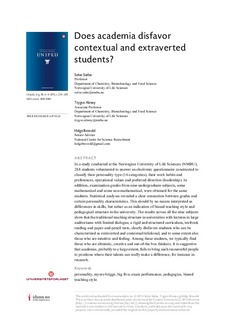Does academia disfavor contextual and extraverted students?
Peer reviewed, Journal article
Permanent lenke
http://hdl.handle.net/11250/2381708Utgivelsesdato
2015Metadata
Vis full innførselSamlinger
- Publikasjoner fra CRIStin - NTNU [38294]
Originalversjon
UNIPED 2015, 38(4):274-283Sammendrag
In a study conducted at Norwegian University of Life Sciences (NMBU) 288 students volunteered to answer an electronic questionnaire constructed to classify their personality type (16 categories), their work habits and preferences, operational values and preferred direction (leadership). In addition exam grades from nine undergraduate subjects, some mathematical and some non-mathematical, were obtained for the same students. Statistical analyses revealed a clear connection between grades and some personality characteristics. This should by no means interpreted as differences in skills, but rather as an indication of biased teaching style and pedagogical structure in the university. The results show across all the nine subjects that the traditional teaching structure in universities with lectures in large auditoriums with limited dialog, a rigid and structured curriculum, textbook reading and paper-and-pencil tests, clearly disfavors students which can be characterized as extraverted and contextual/relational, and to some extent also those being intuitive and feeling. Among these students we typically find those being altruistic, creative and out-of-the box thinking. It is suggestive that academia, to probably a large extent, fail to bring such resourceful people to positions were their talents really can make a difference, for instance in research.
